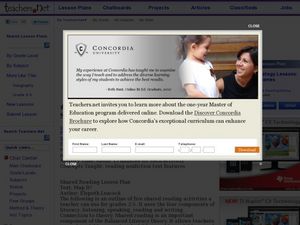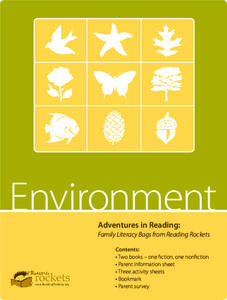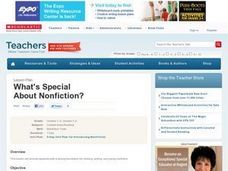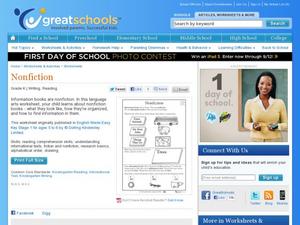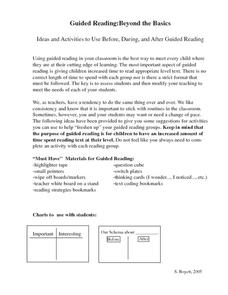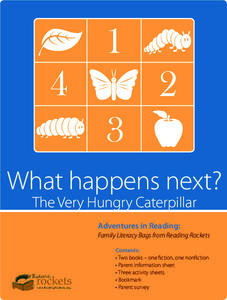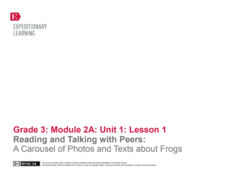Odell Education
Reading Closely for Textual Details: Grade 12
Help your class examine humanity's unpredictable nature through "Life Steps Almost Straight." Learners read various works from philosophers such as Viktor Frankl, The Buddha, and Nietzsche to gather textual evidence and explain their...
Curated OER
Discussing Non-Fiction Texts
Discuss non-fiction texts and fact and opinion. Learners discuss the features of non-fiction text, identify how to distinguish fact from opinion, and list ways to display information, including graphs, charts, and diagrams. While this is...
Odell Education
Reading Closely for Textual Details: Grades 9-10
Pupils work in small groups to answer guided questions and discuss the details they found. They also read independently, improving strategies they learned to approach and question text.
EngageNY
Close Reading: Paragraph 4 of “Refugee and Immigrant Children: A Comparison”
Why is reading a text closely a helpful skill? Using the 13th of 20 lessons from the Grade 8 ELA Module 1, Unit 2 series, scholars continue reading the informational text "Refugee and Immigrant Children: A Comparison." They work with...
Blogger
Help with Reading
Children's education doesn't have to end when they leave the classroom. Support parents with imporving their children's reading comprehension skills at home with this list of guiding questions.
Curated OER
Using Social Studies in Five Shared Reading Lessons: Geography
After several short 15-minute mini-lessons, your learners will gain an understanding of the characteristics of a non-fiction text. Using the book Map It by Elspeth Leacock, your class will become acquainted with non-fiction terms...
Polk Bros Foundation
How to Summarize a Non-Fiction Passage
After reading a text, one way to find out how much your class comprehended is to ask your pupils to summarize. This worksheet helps class members prepare for writing a summary of a nonfiction text. They note down the topic, up to eight...
Curated OER
Nonfiction Text Features
Identify features of a nonfiction article in this language arts lesson. Middle schoolers apply comprehension strategies as they read the parts of the article, and analyze the author's key points. Additionally, they examine information in...
PBS
Reading Adventure Pack: Environment
A fiction and nonfiction text, The Great Kapok Tree: A Tale of the Amazon Rain Forest by Lynne Cherry and I See a Kookaburra! Discovering Animal Habitats Around the World by Steve Jenkins and Robin Page begins a learning experience in...
PBS
Reading Adventure Pack: Farms
A Reading Adventure Pack features a fiction and nonfiction text—The Oxcart Man by Donald Hall and illustrated by Barbara Cooney and Farming by Gail Gibbons. Following the readings, scholars make a collage showcasing foods farmed from...
PBS
Reading Adventure Pack: Money
Money is the topic of a reading adventure pack. Third graders read two books—one fiction, one non-fiction—and complete a series of activities. Learners draw an item they wish to save money for, examine coins to start a collection, and...
Curated OER
Three-Level Reading Guide- The Apaches: People of the Southwest
A reading guide designed for Jennifer Fleischner's nonfiction text, The Apaches: People of the Southwest, provides readers with three levels of comprehension questions meant to encourage higher-level thinking.
Curated OER
Fluency Passages, 6th Grade
Prompt your class to examine their own negative cycles with a short reading passage. After they finish reading, they answer two questions about concepts that they can find in the text.
Lesson Plansos
Guided Reading Activities with Pizzazz
Get the most out of your guided reading lessons with this collection of literacy materials. Offering a system for using color-coded tags to mark pages while reading books, as well as an assortment of comprehension and grammar...
Curated OER
What's Special About Nonfiction?
Students examine the difference between nonfiction and fictional writing. They identify the characteristics of nonfiction literature and examine how a nonfiction textbook organizes information.
Curated OER
Nonfiction
As scholars begin using informational texts, it's important they understand their uses and features. This visual worksheet has readers match three text titles to corresponding pictures. Next, they examine a book cover with the...
Curated OER
Using a Title to Determine Main Idea (Nonfiction)
Young readers explore a nonfiction text for its main idea. They will listen to the book Animal Sight by Kirsten Hall, and then observe as the teacher models a main idea think-aloud. Later, for independent practice, they listen to the...
Florida Center for Reading Research
Comprehension: Text Analysis, Fiction and Nonfiction Find
Scholars analyze fiction and nonfiction text and fill in a worksheet detailing the text's title, genre, and reason for its classification.
Curated OER
Mixed Bags: Fiction and Nonfiction
The second in a series of three lessons from Scholastic comparing and contrasting fiction and nonfiction, this activity requires learners to read, write, and compare two books independently. After briefly reviewing the features of...
PBS
Reading Adventure Pack: Rocks
A Reading Adventure Pack focuses on rocks. Scholars participate in three activities after reading a fiction and nonfiction text—The Jade Stone, a Chinese folktale adapted by Caryn Yacowitz, and Rocks in His Head by Carol Otis Hurst....
Ideas From Suzi
Guided Reading: Beyond the Basics
Elevate children's reading comprehension skills with this collection of guided reading resources. From paper dice with basic comprehension questions printed on them to a system for using sticky notes to identify key...
PBS
Reading Adventure Pack: What's Next? The Very Hungry Caterpillar
A series of hands-on activities follows a reading of The Very Hungry Caterpillar by Eric Carle. Learners create a paper collage to explore the beginning, middle, and end of days of the week, numbers, and more. They grow a butterfly...
EngageNY
Reading and Talking with Peers: A Carousel of Photos and Texts about Frogs
Frogs are the theme of a lesson plan that challenges scholars to examine photographs, read informational texts, then ask and answer questions. Scholars work collaboratelively as they rotate through stations, discuss their observations,...
EngageNY
Analyzing Text Structure: “The Shakespeare Shakedown”
Pupils continue reading and discussing Simon Schama's article "The Shakespeare Shakedown." They work together to analyze the article's paragraph structure, completing a note-catcher worksheet.







